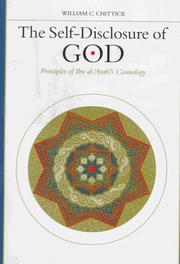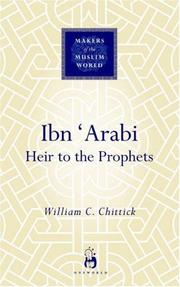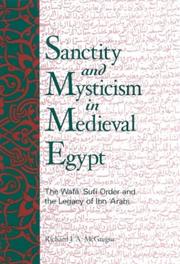| Listing 1 - 10 of 21 | << page >> |
Sort by
|

ISBN: 058506671X 9780585066714 0791434036 0791434044 9780791434031 9780791434048 079142250X 9780791422502 0791422496 9780791422496 9780791498965 0791498964 Year: 1998 Publisher: Albany State University of New York Press
Abstract | Keywords | Export | Availability | Bookmark
 Loading...
Loading...Choose an application
- Reference Manager
- EndNote
- RefWorks (Direct export to RefWorks)
Explicates the cosmology of Ibn al-'Arabi, the greatest mystical thinker of Islamic civilization.
Islam --- Doctrines --- History --- Ibn al-ʿArabī, --- Ibn al-ʿArabī, - 1165-1240 --- Ibn Al-Arabi, 1165-1240 --- Ibn al-arabi, 1165-1240
Book
ISBN: 2862180033 Year: 1977 Volume: 1 Publisher: Paris : Éditions orientales,
Abstract | Keywords | Export | Availability | Bookmark
 Loading...
Loading...Choose an application
- Reference Manager
- EndNote
- RefWorks (Direct export to RefWorks)
Sufism --- Soufisme --- Early works to 1800 --- Ouvrages avant 1800 --- Ibn al-'Arabi, --- Ibn al-ʻArabī,
Book
ISBN: 9782841613618 2841613615 Year: 2009 Volume: 47 Publisher: Beyrouth: Albouraq,
Abstract | Keywords | Export | Availability | Bookmark
 Loading...
Loading...Choose an application
- Reference Manager
- EndNote
- RefWorks (Direct export to RefWorks)
Death --- Mort --- Religious aspects --- Islam --- Aspect religieux --- Ibn al-'Arabi, --- Criticism and interpretation. --- Ibn al-ʻArabī,
Periodical
Year: 1982 Publisher: Fritwell, England : The Society,
Abstract | Keywords | Export | Availability | Bookmark
 Loading...
Loading...Choose an application
- Reference Manager
- EndNote
- RefWorks (Direct export to RefWorks)
Sufism --- Ibn al-ʻArabī, --- Ibn al-Arabi, --- Ibn al-ʻArabī, Muḥammad b. ʻAlī,
Book
ISBN: 0791485471 Year: 2004 Publisher: Albany : State University of New York Press,
Abstract | Keywords | Export | Availability | Bookmark
 Loading...
Loading...Choose an application
- Reference Manager
- EndNote
- RefWorks (Direct export to RefWorks)
"Using the original writings of two Egyptian Sufis, Muhammad Wafa' and his son 'Ali, this book shows how the Islamic idea of sainthood developed in the medieval period. Although without a church to canonize its "saints," the Islamic tradition nevertheless debated and developed a variety of ideas concerning miracles, sanctity, saintly intermediaries, and pious role models. In the writings of the Wafa's, a complete mystical worldview unfolds, one with a distinct doctrine of sainthood and a novel understanding of the apocalypse. Using almost entirely unedited manuscript sources, author Richard J.A. McGregor shows in detail how Muhammad and 'Ali Wafa' drew on earlier philosophical and gnostic currents to construct their own mystical theories and notes their debt to the Sufi order of the Shadhiliyya, the mystic al-Tirmidhi, and the great Sufi thinker Ibn 'Arabi. Notably, although located firmly within the Sunni tradition, the Wafa's felt free to draw on Shi'ite ideas for the construction of their own theory of the final great saint."--Jacket
Sufism --- Muslim saints --- History. --- Wafā, Muḥammad, --- Ibn al-ʻArabī, --- Wafa, Muhammad, --- Ibn al-Arabi,

ISBN: 1851683879 9781851683871 Year: 2005 Publisher: Oxford: Oneworld,
Abstract | Keywords | Export | Availability | Bookmark
 Loading...
Loading...Choose an application
- Reference Manager
- EndNote
- RefWorks (Direct export to RefWorks)
Sufism. --- Ibn al-ʿArabī, --- Ibn al-ʿArabī, --- Criticism and interpretation --- Sufis --- Sufism --- Biography --- Ibn al-`Arabi --- Biography. --- Ibn al-`Arabi, --- Ibn al-ʿArabī, - 1165-1240 --- Ibn al-ʿArabī, - 1165-1240 - Criticism and interpretation --- Ibn al-'Arabi, --- Ibn al-ʿArabī, - 1165-1240
Book
ISBN: 9782070137954 2070137953 Year: 2012 Volume: 394 Publisher: Paris: Gallimard,
Abstract | Keywords | Export | Availability | Bookmark
 Loading...
Loading...Choose an application
- Reference Manager
- EndNote
- RefWorks (Direct export to RefWorks)
Né à Murcie en 1165, mort à Damas en 1240, Ibn Arabî - "le Maître spirituel par excellence" - exerce depuis huit siècles une influence majeure sur la mystique musulmane. Critiquée, aujourd'hui comme hier, par les adversaires du soufisme, son oeuvre immense offre en particulier la première formulation globale et cohérente d'une doctrine de la sainteté en islam. Cet enseignement, qui ne sépare jamais l'énoncé doctrinal de l'expérience visionnaire, expose une vaste typologie des saints fondée sur la notion d'héritage prophétique. Il décrit avec précision les étapes et les épreuves redoutables du voyage spirituel. Mais si cet itinéraire est d'abord une montée vers Dieu, il ne trouve son accomplissement que dans le retour vers les créatures, faisant ainsi du saint l'indispensable médiateur entre Ciel et terre
Holiness --- Prophecy --- Sainteté --- Prophétie --- Islam --- Ibn al-'Arabi, --- Sufism --- Muslim Saints --- Doctrines --- Cult --- History --- Ibn al-ʿArabī, --- Sainteté --- Prophétie --- Ibn al-ʻArabī, --- Islam. --- Sufism - Doctrines --- Muslim Saints - Cult - History --- Ibn al-ʿArabī, - 1165-1240

ISBN: 0791460118 9780791460115 0791460126 9780791460122 1417575832 9781417575831 9780791485477 0791485471 Year: 2004 Publisher: Albany State University of New York Press
Abstract | Keywords | Export | Availability | Bookmark
 Loading...
Loading...Choose an application
- Reference Manager
- EndNote
- RefWorks (Direct export to RefWorks)
"Using the original writings of two Egyptian Sufis, Muhammad Wafa' and his son 'Ali, this book shows how the Islamic idea of sainthood developed in the medieval period. Although without a church to canonize its "saints," the Islamic tradition nevertheless debated and developed a variety of ideas concerning miracles, sanctity, saintly intermediaries, and pious role models. In the writings of the Wafa's, a complete mystical worldview unfolds, one with a distinct doctrine of sainthood and a novel understanding of the apocalypse. Using almost entirely unedited manuscript sources, author Richard J.A. McGregor shows in detail how Muhammad and 'Ali Wafa' drew on earlier philosophical and gnostic currents to construct their own mystical theories and notes their debt to the Sufi order of the Shadhiliyya, the mystic al-Tirmidhi, and the great Sufi thinker Ibn 'Arabi. Notably, although located firmly within the Sunni tradition, the Wafa's felt free to draw on Shi'ite ideas for the construction of their own theory of the final great saint."--Jacket
Muslim saints --- Sufism --- History. --- Wafā, Muḥammad, --- Ibn al-ʻArabī, --- Ibn al-ʿArabī, Muḥammad ibn ʿAlī Muḥyī al-Dīn (1165-1240 ) --- Saints musulmans --- Soufisme --- Influence --- Égypte --- 14e siècle --- Moyen âge --- Wafa, Muhammad, --- Ibn al-Arabi,
Book
ISBN: 9782351590218 235159021X Year: 2007 Volume: 228 Publisher: Damas: Institut français du Proche-Orient,
Abstract | Keywords | Export | Availability | Bookmark
 Loading...
Loading...Choose an application
- Reference Manager
- EndNote
- RefWorks (Direct export to RefWorks)
Islamic philosophy --- Hermeneutics --- Philosophie islamique --- Herméneutique --- Congresses. --- Congrès --- Ibn al-'Arabi, --- Symbolism --- Ibn al-ʻArabī, --- Ibn al-ʻArabī, --- Herméneutique --- Congrès --- Islamic philosophy - Congresses --- Hermeneutics - Congresses --- Ibn al-ʻArabī, - 1165-1240 - Congresses --- Ibn al-ʻArabī, - 1165-1240 - Symbolism - Congresses --- Ibn al-ʻArabī, - 1165-1240
Book
ISBN: 2841612759 9782841612758 Year: 2006 Volume: 40 Publisher: Beyrouth: Albouraq,
Abstract | Keywords | Export | Availability | Bookmark
 Loading...
Loading...Choose an application
- Reference Manager
- EndNote
- RefWorks (Direct export to RefWorks)
Jesus Christ in the Koran. --- Jésus-Christ dans le Coran. --- Ibn al-'Arabi, --- Teachings. --- Enseignements. --- Jesus Christ in the Koran --- Jesus Christ --- Ibn al-ʿArabī, --- Ibn al-ʿArabī, --- In the Qurʼan --- Criticism and interpretation --- Jésus-Christ dans le Coran. --- Ibn al-ʻArabī, --- Jesus Christ - In the Qurʼan --- Ibn al-ʿArabī, - 1165-1240 - Criticism and interpretation --- Ibn al-ʿArabī, - 1165-1240 --- Ibn al-ʿArabī, - 1165-1240
| Listing 1 - 10 of 21 | << page >> |
Sort by
|

 Search
Search Feedback
Feedback About UniCat
About UniCat  Help
Help News
News